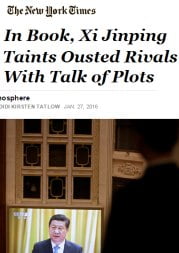Remember that time in late 2012 when Xi Jinping disappeared for a couple of weeks? One story was that he had been hit with a chair when a brawl broke out during a meeting of princelings. As a red herring, this would be clever: so absurd and embarrassing that it couldn’t be made up. A deeper, darker suspicion was that there had been a coup attempt. The subsequent rounding-up of Bo Xilai, Zhou Yongkang, General Xu Caihou, Ling not- my-dead-Ferrari-driver-son Jihua and others supported this notion. Now it’s pretty much official – Xi publicly states that the Party thwarted ‘political plot activities’.
my-dead-Ferrari-driver-son Jihua and others supported this notion. Now it’s pretty much official – Xi publicly states that the Party thwarted ‘political plot activities’.
Assuming that this isn’t another that’s-what-they-want-us-to-think ruse, the implication is that Xi is now totally in charge and all possibilities of treachery eliminated. So everything is fine and dandy.
But of course there is that economic cataclysm/slightly bumpy landing looming. The more frantically Chinese state media insist that everything is great, the data are accurate and reform is proceeding apace, the worse our expectations get. Last year’s stock market/exchange rate screw-ups were clear signs that there is no grand strategy – they are making it up as they go along. It looks like the sort of panicky decision-making you would expect when one man has assumed an unhealthy degree of control, doesn’t understand economics, and is surrounded by people who tell him he is correct and flawless. The clampdowns on human-rights-and-everything add to the impression of an emperor with no restraints and no idea of what to do next except cover problems up.
Wang Baoan, the guy in charge of China’s statistics has just been arrested, ‘apparently for corruption’. This is just a day or two after experts and reporters at Davos and around the world mocked (or continued mocking) the nation’s economic data as fabricated. As that Washington Post story reminds us, deputy head of Beijing’s Taiwan Affairs Office Gong Qinghai was placed under investigation for corruption last week, just days after Tsai Ing-wen’s victory. And the same happened to vice-chairman of the Securities Regulatory Commission Yao Gang in November, a few months after the stock-market crash. And let’s not forget the other regulators and banker/fund manager types getting arrested and in some cases apparently committing suicide.
Xi might have defeated an attempted coup, but here is a classic case of the ‘enemy is us’ – his system’s own inability to get out of its economic morass. Real reform is out of the question as it means the Communist Party will lose its grip on power. Avoiding reform is also out of the question as the loss of legitimacy also means the Communist Party will lose its grip on power. The only thing he can be certain of is that the Party will not lose its grip on power. A conundrum he can only hope an ongoing slaughter of the scapegoats will solve.


Man plans, god laughs. ~ Yiddish proverb.
Not that the CCCP believes in gawd; neither do, for that matter. Still, something in the universe gets off screwing with us.
“will not” should say “will”?
I leave following Xi to the SCMPravda. They must have more pictutes of him than Goebbels had of Hitler. Xi always looks like an irked, sometimes a despondent, koala. He obviously had a personality bypass early on.
@”the nation’s economic data as fabricated:
Every nation’s economic data is “fabricated”…. more or less.
The embarrassing bits are hidden and then “adjusted” later and retrospectively when governments think the press or the financial markets are no longer watching……the eve of long holiday weekends are a good time for this con and usually with a small-print explanation about ” seasonal adjustments”. If this doesn’t pull the wool over the eyes of those who can be bothered reading the figures, they might try “adjusted for trend or cyclical components’ . A last gasp at covering over their earlier lies will be a somewhat more reasonable explanation “the error component”.
The Chinese Government still has a whole bag of unused tricks up their sleeves. They still haven’t resorted on the same scale to the USA and Britain’s “Helicopter Ben” strategy to rig the “growth” figures.
Printing money might come in handy. It will pull down the “over-valued” Yuan and stimulated Chinese exports if there are any Walmart shops left open . Notice how it is no longer fashionable in Washington to hark on about the “manipulated” or ” under valued” Yuan. First it was “too low” and behold after letting it appreciate over 20% it is now “too high” . Its always got to be China’s fault.
I am not even going to bother with QJ’s misunderstandings of introductory textbook economics, I’ll leave that to people more fond of self-flagellation than I.
I will say this looks like a regime with fundamentally weak institutions. They don’t have working systems, processes or rules. It’s just patronage networks and perverse incentives all the way down. They don’t have governance tools other than tossing people in jail when things go wrong.
For schizophrenics with a superiority/inferiority complex, it’s all in the timing. They devote great attention to second-level antics; to multiple, interlocking walls of secrecy and to selective, impeccably presented, revelations to select media; to striking a balance, via finely-tuned minimaxing, between the universal hatred and the remaining, heavily fortified, shoals and reefs of self-esteem.
The plot, then, or perhaps “plot”, has been mopped up, down to the last trace of fluid under boots and in crevices, as spurted splashes and in vaporised form — if not, what is the point of flaunting it?
On the other hand, there must be some regime-threatening catastrophe just below the horizon, as otherwise why vaunt it now?
I have suspected for some time that Xi’s use of ‘corruption’ is the new codeword for what used to be called ‘rightist counterrevolutionary activities’
From The New York Times: “The greater these people’s power, the more important their position, the less seriously they took party discipline and political rules, to the point of recklessness and audaciousness!” Mr. Xi said. “Some had inflated political ambitions and for their personal gain or the gain of their clique carried out political plot activities behind the party’s back, carried out politically shady business to wreck and split the party!”
He rose, and with his careful eyes surveyed
The Party members in their ranks arrayed.
The pushy ones, ambitious or defiant,
Were finished now; these were all compliant.
And yet, he felt, uneasy and disgusted,
He could not see a single one he trusted.
He spoke: “The more they rose, the higher their position,
The greater grew their personal ambition.
Recklessly, they plotted an attack
In secret, crouching at the Party’s back!”
The gods looked down and laughed; the sages mild
Pulled their hoary beards and gently smiled.
“He’s proud because a coup has been defied;
If he were strong, they never would have tried!”
Stay alert!
Trust no one!
Keep your laser handy.
Cannot believe I am doing this …
In support of QJ’s point, yes the numbers coming out of Western statistics bureaus are are hogwash, and have been getting more and more so over the last 20 to 30 years.
Evidence #1: Inflation and real GDP growth – If you measure inflation according to the classical economic method or actually just measuring how a basket of prices change (i.e. the method used pre-1980) inflation would be running at about 10%. Even if one uses the pre-1990 method, inflation would be running at around 5~6%. Change was driven by the US government, who co-opted a segment of academia to support a rather inane argument, in order to reduce reported inflation and also at the same time limit public sector liabilities that are inflation-linked, such as US social security payments.
And yes, if you use the old methods of measuring inflation, then real GDP growth in the developed world (i.e. nominal GDP growth adjusted for inflation), becomes negative to the tune of -2 to -7 or -8% … which means that we have been in the equivalent of a Great Depression since 2008, and all the Western QE (incredible theft of public wealth that Western societies – particularly many posters in these ‘ere parts, appear ridiculously blind to) and PRC bank driven credit creation to zombie SOEs (beyond ridiculous, taking the PRC from being one of the least indebted nations to one of the World’s most indebted societies, and is IMO the no. 1 risk to regime stability in the PRC) … are mere bandaids that mask a deep, underlying malaise – the collapse of hierarchical systems of political economy, and the establishment of self-adapting, decentralised network based holoarchical self-organisation, driven by distributed information technologies and a new ideology gestalting among the youf of today – of unity in diversity, and of humanity before creed, race, religion or gender.
In other words, no the West isn’t the best, and in this particular area, none can claim Western government probity. The difference is in China they just choose the number they want, and don’t worry about selling it. In the West, they jiggle multivariable computational matrices, statistical deviations, and employ a wide range of stastitical tricks to get numbers that support the prevailing narrative.
Evidence #2: Unemployment numbers may be statistically correct, but the mainstream media focusses on what is now officially a meaningless number. Why dont we hear about the labor participation rate in the MSM, which is at its lowest since the 1970s? Why is it a positive thing for unemployment to go down as a result of long-term unemployed exiting the labor force, if it leads to an overall reduction in the total number of people in employment (and remains depressed)? How can the West be in economic recovery with stagnant real wages and record low numbers of working people, as a percentage of the population (not even taking into account Europe, where employment is beyond disastrous)? Why are financial asset prices viewed as the number one indicator of economic health, in an era of negative interest rates and insane corporate buyback numbers? Hullo people…
How can you equate the loss of a full-time job, a managerial or factory job, and give it the same statistical value as a “zero-hours” part time contract for recent university grad who works half a day a week in the local subway?
Insanity, and it is sanctioned, nay, driven, by Western governments in order to mask their own incredible incompetence (the best case scenario), or deliberate and intentional attempts to maintain a social and political system that is based on division, hierarchy, deception, strife and conflict.
Not to say China is any better (lets go kill the Uighurs / Tibetans / Japanese etc etc) … but come on people, the West is no better in this regard.
A leading econometrician/consultant for corporates in the US who can help you decipher the funny numbers coming out of Western governments these days is John Williams.
http://www.shadowstats.com/
And before anyone accuses me or John of conspiracy nuttiness … here is an article on Mr. Williams and his numbers by CNBC. So now you can rest easy that it must be true, because Western media is “trustworthy” and not “propaganda”…
http://www.cnbc.com/id/42551209
p.s. QJ don’t get used to it
p.p.s. *deletes religion due to repetition and replaces it with nationality.
In no way an economist, I would like to support another of Qian Jin’s points. He writes:
Notice how it is no longer fashionable in Washington to hark on about the “manipulated” or ” under valued” Yuan. First it was “too low” and behold after letting it appreciate over 20% it is now “too high” .
It feels like only the day before yesterday that China was being castigated for the too low Yuan. Now, without apology or shame or self-awareness, the financial pundits say the opposite.